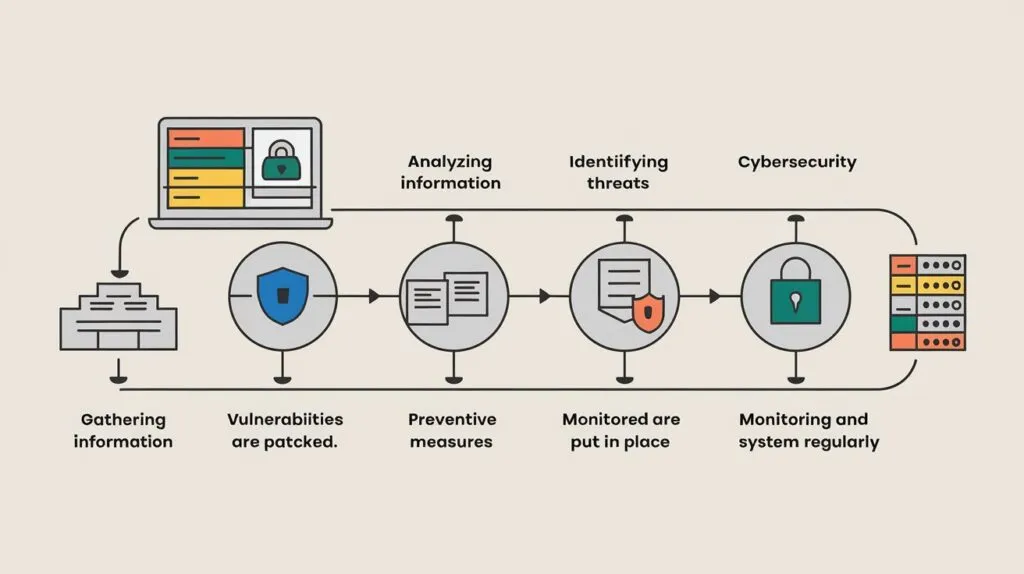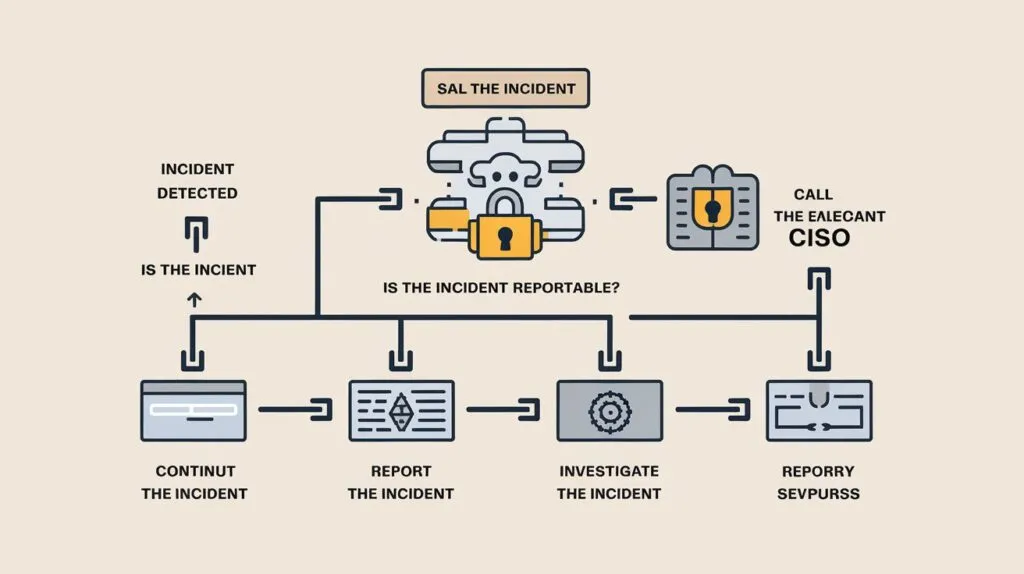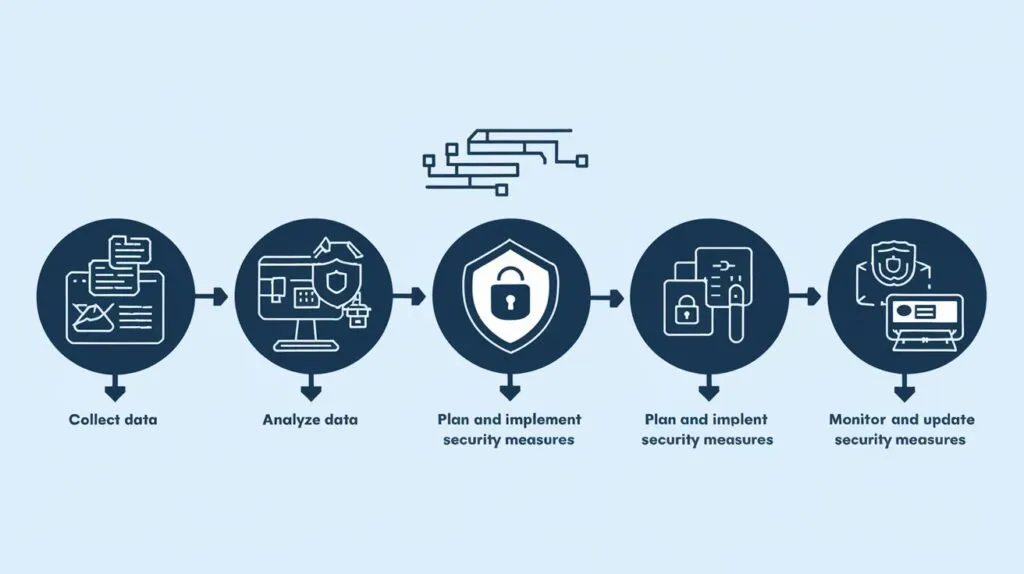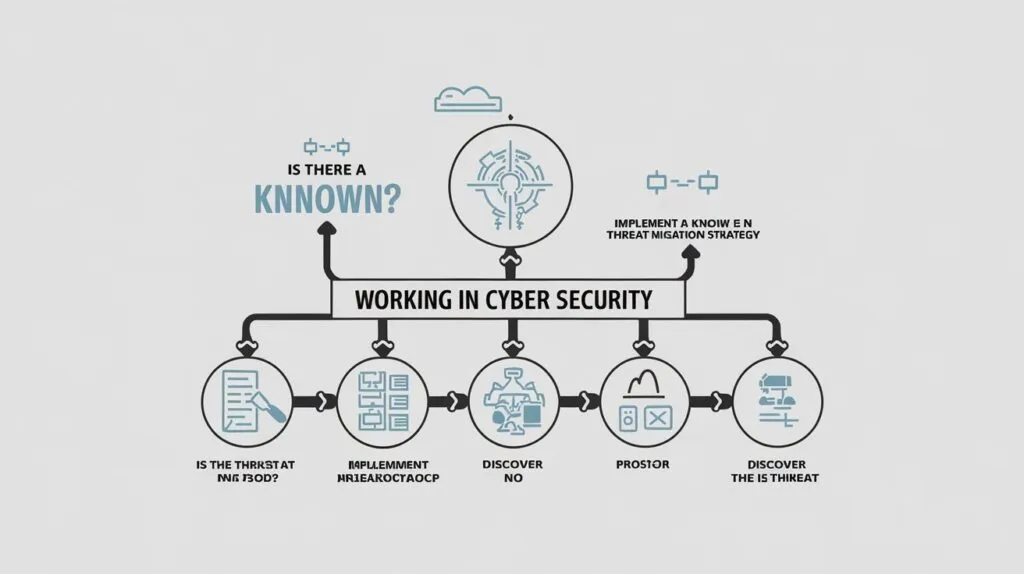Cyber security job is a fulfilling and it comes with lots of complexities. The global market is expected to hit $300 billion by 2024. With more cyber threats, this field is in high demand. Working in cyber security?
As a cybersecurity pro, you’ll protect organizations from attacks. You need technical skills and knowledge. This makes it an exciting career path.
Key Takeaways
- The demand for cybersecurity professionals is increasing rapidly
- Cybersecurity career can be a highly rewarding and challenging experience
- Cybersecurity jobs require a unique blend of technical skills and knowledge
• It is estimated that the cybersecurity market will show an annual growth of 15% by 2024 and exceed $300 billion.
- Cybersecurity professionals play a critical role in protecting organizations from cyber threats
- A career in cybersecurity can be a promising field to explore for those interested in technology and security

What Makes Cyber Security a Critical Field Today
Cyber security is an emerging profession that aims to safeguard people, organizations and governments from cyber risks. The main reason is that, as your technology gets better, new threats just appear on a daily basis. This means for instance for system and data security there should be revived professional in this area.
A recent report by Cybersecurity Ventures argues that the cyber security market will reach $300 billion by 2024. This has lead to more growth as a result of more cyber attacks. : therefore, cybersecurity training and cyber security certification are essentials in the career path of this sector. Important areas include:
- Network security
- Cloud security
- Cybersecurity governance
- Incident response
Companies want people who can create and use good cyber security plans. With the right cybersecurity training and cybersecurity certification, you can get the skills needed to do well in this field.
Global Organizations cannot afford to overlook cyber security. Malicious activities on the online platform are likely to result to a huge loss, negative impact on the image of the firm, and possibly legal consequences. Thus, every company ought to spend in cybersecurity training and cybersecurity certification in order to protect assists from malicious hacks and ensure business continuity.
Current Threat Landscape
This threat spectrum is evolving at a very high rate as the cyber attackers adopt better technologies in AI and machine learning. Companies should remain proactive by making cybersecurity training and cybersecurity certification important priorities.
Growing Demand for Professionals
Cyber security experts are in demand today more than ever. There is currently a need for talented individuals to defend organizations’ systems and information. With the correct cybersecurity training and cybersecurity certification, one can secure skills and information required to become successful in this area.
Impact on Global Business
It is evident that cyber security plays an important role in international business. These attacks can result in decrease of millions of dollars of the organization’s value, tarnish the organization’s image and lead to legal ramifications. As a result it becomes important for companies to incorporate with cyber security training and cyber security certification so as to ensure security and continuity of business.

Essential Skills for Working in Cyber Security
When entering the field of cyber security, one must have obtain technical skills as well as soft skills. Specific cyber security competence that are now in demand include: knowledge of operating systems and networking protocols. Consequently, an ability to solve problems, think critically is more than just desirable, it is essential.
In a report, the SANS Institute reveals that organizations seek cybersecurity professionals with the skills in cloud security, artificial intelligence, and machine learning as the most pressing demands. Staying awake to the latest technology as well as trends is important. This means never-ending education starting from cybersecurity knowledge and training.
Some important skills for a cyber security career include:
- Knowledge of operating systems and networking protocols
- Understanding of cybersecurity frameworks and regulations
- Strong problem-solving and critical thinking skills
- Ability to stay up-to-date with the latest technologies and trends
In summary, having the right mix of technical and soft skills is essential for a career in cyber security. By focusing on cybersecurity education and keeping up with new tech, you can develop the skills needed to thrive in this field.
| Skill | Importance |
| Cloud security | High |
| Artificial intelligence | High |
| Machine learning | High |
Educational Pathways to Enter Cyber Security
Cyber security career start may be exciting and rewarding. Hence with more jobs available, it is important to consider how it is possible to learn. Cybersecurity degree provides a nice foundation because it explains what cyber security is, what technology it involves and how to do it properly.
Report by the National Center for Education Statistics reveal more students are enrolling in cybersecurity certification courses. This rise indicates that there is stiff market demand for cyber security professionals and a need to train those interested in the profession.

Degree Programs
Degrees in cyber security range from associate’s to master’s, with many specializations. Some common ones are:
- Bachelor’s in Cyber Security
- Master’s in Information Assurance
- Associate’s in Cyber Security Technology
Professional Certifications
Having even a basic CompTIA Security+ or CISSP certification will prove that you care for cyber security. Full time students should prefer them especially if they are interested in a certain area of cyber security or if they wish to enhance their career.
Self-Study Options
The other way of learning cyber security by yourself is by taking online course and tutorials. They are portable and cost effective. A great tool for beginners to get an idea of what cyber security is, or for people who want to become better in a specific area.
Different Career Paths in Cyber Security
Cybersecurity holds a lot of cybersecurity jobs for different abilities and preferences in relation to skills. To access the different cybersecurity jobs, it is to consider the general fact on job presence in the sector. According to the Bureau of Labor Statistics, employment of information security analysts is projected to grow 31 percent from 2020 to 2030.

Some main career paths in cybersecurity include:
- Security Analyst: watches and analyzes security threats
- Penetration Tester: tests defenses by simulating cyber attacks
- Security Engineer: creates and sets up secure systems and networks
- Chief Information Security Officer: leads an organization’s cybersecurity strategy
All these cybersecurity career options require special skills and knowledge. Despite this, all contribute to the enhancement of defense against cyber threats to organizations. Since there are more positions in cybersecurity required now is the best time to consider a career in this area.
Consider what is the job that peaks your interest and what related skills you possess when considering these careers. People can have a great fulfilling job and also have the opportunity to work hard and challenge themselves if trained and experienced in the cybersecurity field.
| Career Path | Job Description | Required Skills |
| Security Analyst | Monitor and analyze security threats | Networking, operating systems, threat analysis |
| Penetration Tester | Simulate cyber attacks to test defenses | Networking, programming, vulnerability assessment |
| Security Engineer | Design and implement secure systems and networks | Networking, cryptography, secure coding |
| Chief Information Security Officer | Oversee overall cybersecurity strategy | Leadership, risk management, cybersecurity governance |
Day-to-Day Life Working in Cyber Security
Cybersecurity daily life is rather enriched with a lot of necessary tasks and engagements. Cybersecurity people sit in front of a screen all day watching systems, reading logs, and mitigating threats. A report filed by SANS Institute reveals that these activities are critical in mitigating and halting attacks.
Knowledge update hence becomes a critical requirement especially in cybersecurity work where the threats are ever evolving and new technologies are being developed. This means, Readily admission that their abilities continue to develop. Everyday skills that are important for a cybersecurity job consist of problem solving ability, analytical thinking and effective communication skills.
A typical day in cybersecurity work might include:
- Monitoring systems for potential security breaches
- Analyzing logs to identify suspicious activity
- Responding to incidents and mitigating damage
People who transition their career for working in cybersecurity daily life could find them enjoyable, yet very demanding. It requires a good foundation in cybersecurity work and can-do ethic approach to continual education and career development.

Salary Expectations and Career Growth
Cybersecurity roles are much sought for and remuneration is as expected high. The average cybersecurity salary in May 2020 for info security analyst was $103,590. This number will increase as the demand for cybersecurity career advancement increases.
Several factors can affect cybersecurity salary and cybersecurity career growth:
- Level of experience
- Industry and location
- Specific job role and responsibilities
Entry-Level Positions
Entry-level jobs in cybersecurity start at $60,000 to $80,000 a year. These jobs might be security analyst, junior penetration tester, or cybersecurity specialist.
Mid-Career Opportunities
Mid-career jobs in cybersecurity pay $80,000 to $120,000 a year. These roles could be senior security analyst, penetration tester, or cybersecurity engineer.
Senior-Level Compensation
Senior roles in cybersecurity can earn $120,000 to $200,000 a year or more. These jobs might include chief information security officer, cybersecurity director, or senior cybersecurity engineer.
| Job Role | Salary Range |
| Entry-Level | $60,000 – $80,000 |
| Mid-Career | $80,000 – $120,000 |
| Senior-Level | $120,000 – $200,000 |
Required Certifications and Qualifications
To succeed in cybersecurity, you need the right cybersecurity certifications and qualifications. A report by CompTIA shows the most sought-after cybersecurity certifications are CompTIA Security+, CISSP, and CEH. These certifications show your expertise and dedication, helping you move up in your career.

Some key cybersecurity qualifications include:
- CompTIA Security+: This entry-level certification teaches the basics of network security and risk management.
- CISSP: This advanced certification covers a wide range of topics, like security and risk management, asset security, and software development security.
- CEH: This certification focuses on ethical hacking and penetration testing.
Having the right cybersecurity certifications and qualifications makes you stand out in a competitive job market. It helps you advance in your cybersecurity career.
By getting these certifications, you show your expertise and commitment to cybersecurity. This increases your chances of success in a cybersecurity career.
| Certification | Description |
| CompTIA Security+ | Entry-level certification that covers the basics of network security and risk management |
| CISSP | Advanced certification that covers a broad range of topics, including security and risk management, asset security, and software development security |
| CEH | Certification that covers the topics of ethical hacking and penetration testing |
Common Challenges and How to Overcome Them
Cybersecurity experts face many challenges daily. A report by the SANS Institute shows that keeping up with new threats and tech is a big worry. Managing work stress and finding a balance between work and life are also big cybersecurity challenges.
To tackle these issues, experts use effective cybersecurity solutions. They focus on their tasks, set achievable goals, and take breaks to lower stress. It’s also key to stay updated with new threats and tech, which can be done through continuous learning and training.
- Creating a schedule to manage workload and reduce stress
- Setting aside time for ongoing education and training
- Prioritizing self-care and maintaining a healthy work-life balance
By knowing the common cybersecurity challenges and using good cybersecurity solutions, experts can do well in this field. They help protect companies from cyber threats.
| Challenge | Solution |
| Staying up-to-date with latest threats and technologies | Ongoing education and training |
| Managing workload and stress | Prioritizing tasks, setting realistic goals, and taking regular breaks |
| Maintaining work-life balance | Setting aside time for self-care and prioritizing personal well-being |
Building Your Professional Network
Building a strong professional network is key for career growth in cybersecurity. A report by the Cybersecurity and Infrastructure Security Agency shows that a good network helps professionals keep up with new trends and find jobs. It also aids in career advancement.
In cybersecurity, cybersecurity networking is vital for success. By going to industry events, joining online groups, and finding mentors, professionals can grow their network and enhance their skills.

Industry Events
Industry events are a great chance to meet others in the field and learn about new cybersecurity developments. Conferences, workshops, and seminars are some of the popular ones.
Online Communities
Online communities, like forums and social media groups, are excellent for connecting with cybersecurity pros. They keep you updated on the latest threats and technologies. These communities are great for cybersecurity community building and networking.
Mentorship Opportunities
Mentorship offers valuable guidance and support for cybersecurity professionals. Finding a mentor with field experience can give you insights and help improve your skills.
Ways to build a professional network in cybersecurity include:
- Attending industry events and conferences
- Joining online communities and forums
- Finding mentorship opportunities
- Participating in cybersecurity networking groups
By creating a strong professional network, cybersecurity professionals can move forward in their careers. They can also stay current with the latest in the field.
| Networking Opportunity | Description |
| Industry Events | Conferences, workshops, and seminars |
| Online Communities | Forums, social media groups, and online forums |
| Mentorship Opportunities | Guidance and support from experienced professionals |
Tools and Technologies You Need to Master
To succeed in cybersecurity, you must learn the latest cybersecurity tools and cybersecurity technologies. A report by the SANS Institute shows the most wanted cybersecurity tools and cybersecurity technologies. These include cloud security, artificial intelligence, and machine learning.
Key cybersecurity tools and cybersecurity technologies to know include:
- Cloud security platforms
- Artificial intelligence and machine learning algorithms
- Incident response and threat hunting tools
- Security information and event management (SIEM) systems
Knowing these cybersecurity tools and cybersecurity technologies is key to fighting new threats. It’s important to stay updated with new cybersecurity tools and cybersecurity technologies. This keeps you competitive in the field.
Breaking Into the Industry: Practical Steps
Starting a cybersecurity career can be tough but rewarding. A report by the Cybersecurity and Infrastructure Security Agency says building a portfolio and gaining experience are crucial. These steps help you get into the cybersecurity field.
Building a Portfolio
A portfolio shows off your skills and experience. It helps employers see what you can do. Include projects, certifications, and any relevant courses you’ve taken.

Gaining Experience
Getting experience is vital for a good cybersecurity job search. You can get this through internships, volunteering, or bug bounty programs.
Job Search Strategies
It’s important to have good job search strategies. This means networking, making your resume and cover letter fit the job, and being ready for interviews.
By taking these steps, you can boost your chances in the cybersecurity world. Start a fulfilling and challenging cybersecurity career.
Conclusion: Your Future in Cyber Security
Cyber threats are getting more complex, and the need for cybersecurity experts is rising. The Bureau of Labor Statistics says jobs for information security analysts will jump by 31% from 2020 to 2030
To thrive in cybersecurity, focus on improving your technical skills. Keep up with new trends and technologies. Also, build a strong network of professionals. This way, you can aim for a fulfilling career in cybersecurity.
Whether you want to be a cybersecurity analyst, a penetration tester, or a chief information security officer, the possibilities are endless. The field offers great opportunities for growth.
Starting your cybersecurity journey means you’ll face a changing landscape. Being able to adapt and keep learning is key to your success. With persistence, commitment, and a love for protecting digital assets, you can make a big difference. You’ll help keep data and systems safe from cyber threats.

FAQ
What is the current threat landscape in cybersecurity?
The threat landscape in cybersecurity is always changing. New threats pop up every day. Cybercriminals are getting smarter, and companies face more cyber attacks. more
What should a person learn to be effective in the cybersecurity profession?
To work in cybersecurity, you need to know about operating systems and networking. You also need problem-solving skills and to keep up with new tech.
What are the different career paths in cybersecurity?
Cybersecurity offers many career paths. You can be a security analyst, penetration tester, or even a chief information security officer. Each role is vital in protecting against cyber threats.
What are the typical day-to-day tasks and responsibilities of a cybersecurity professional?
Cybersecurity pros do many things. They watch systems, analyze logs, and handle incidents. They also set up security, do risk assessments, and train others.
What are the salary expectations and career growth opportunities in cybersecurity?
Cybersecurity jobs pay well. In 2020, the median salary was $103,590. With more demand, salaries and opportunities will keep growing.
What are the common challenges faced by cybersecurity professionals, and how can they be overcome?
Cybersecurity experts struggle to keep up with threats and manage stress. To tackle these, they can keep learning, manage their time, and find ways to relax.
How can individuals build their professional network in the cybersecurity industry?
Networking is vital in cybersecurity. Attend events, join online groups, and find mentors to grow your network.
What tools and technologies do cybersecurity professionals need to master?
Cybersecurity experts need to know about cloud security, AI, and machine learning. Keeping up with these technologies is crucial for success.
What are the practical steps for breaking into the cybersecurity industry?
To get into cybersecurity, build a portfolio, get experience, and use smart job search tactics. Getting certifications can also show your commitment.


